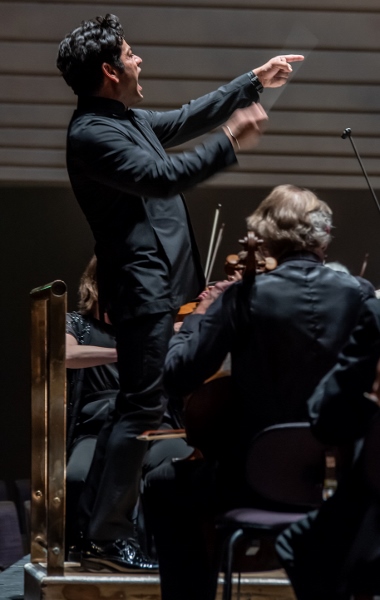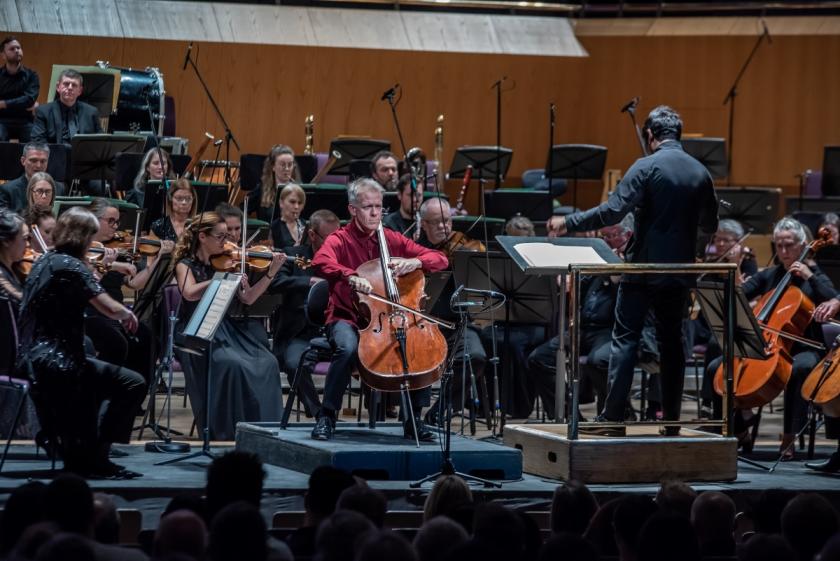Anna Clyne’s This Moment had its UK premiere at Saturday’s BBC Philharmonic concert. She’s the orchestra’s composer in association, and this seven-minute piece was first played by the Philadelphia Orchestra last year.
Inspired by the calligraphy of the late Vietnamese Buddhist monk, Zen Master and peace activist Thích Nhất Hạnh, it’s (in the words of the composer) “a response to our collective grief and loss in recent years” and very much a meditation on death. Not too cheerful a subject, you might think, but Thích Nhất Hạnh said that when you meditate on death you love life more, and that was the impression, perhaps the message, of the music.
Anna Clyne supplies a few hints of a strictly musical kind about the make-up of the piece: alluding to Mozart’s Requiem, from which she quotes “an ascending chromatic line in the sopranos” – she doesn’t say which one exactly, but in my mind it instantly evoked that hairs-on-end ascent, seeming to fly ever higher, in the Lacrimosa. She also explicitly identifies the fugue subject of the Kyrie and the violin figure in the introduction to the Lacrimosa – both clearly audible in her score.
The texture of her writing is very different from Mozart – with a large orchestra it was lush and luxurious, and it built its impact quickly, using a variety of instrumental effects in a fundamentally tonal palette. The brass presentation of that fugal theme was weighty and (although she didn’t tell us this) I wondered whether she was playing with expectations in it, as for many it’s inescapably reminiscent of “And with his stripes we are healed” in Handel’s Messiah – same fugue subject. And in Anna Clyne’s hands the music ends in major-key positivity and peace: as Thích Nhất Hạnh said, thinking of death makes you cherish life more, and “the tears I shed yesterday have become rain”… perhaps that is also a kind of healing.
 Alpesh Chauhan (pictured left) conducted with tenderness and sensitivity, effectively balancing the rich resources of the scoring. His approach is brisk and businesslike, too, and leaves little doubt as to his intentions. It’s a few months over 10 years since I first heard him take command of an orchestra (in Chester Cathedral, as the Royal Northern College of Music brought its International Artist’s Diploma students to the then city festival) – he’s a former cellist, and on that occasion accompanied a cellist, Mikhail Nemtsov, with impressive results. This time his soloist was Alban Gerhardt, in Shostakovich’s Cello Concerto no. 2. The same orchestral strength of 60 strings (with an extended stage in use) was retained from Anna Clyne’s piece, but thanks to Shostakovich’s scoring and Chauhan and the Philharmonic’s sympathy, the solo role was never overshadowed. There’s plenty of thick string writing (with contrabassoon to boot) in it, full of Russian melancholy, but Chauhan was as attendant to the orchestral players’ contribution as he was to the soloist’s.
Alpesh Chauhan (pictured left) conducted with tenderness and sensitivity, effectively balancing the rich resources of the scoring. His approach is brisk and businesslike, too, and leaves little doubt as to his intentions. It’s a few months over 10 years since I first heard him take command of an orchestra (in Chester Cathedral, as the Royal Northern College of Music brought its International Artist’s Diploma students to the then city festival) – he’s a former cellist, and on that occasion accompanied a cellist, Mikhail Nemtsov, with impressive results. This time his soloist was Alban Gerhardt, in Shostakovich’s Cello Concerto no. 2. The same orchestral strength of 60 strings (with an extended stage in use) was retained from Anna Clyne’s piece, but thanks to Shostakovich’s scoring and Chauhan and the Philharmonic’s sympathy, the solo role was never overshadowed. There’s plenty of thick string writing (with contrabassoon to boot) in it, full of Russian melancholy, but Chauhan was as attendant to the orchestral players’ contribution as he was to the soloist’s.
Beautiful writing is mixed with the gloom (and the ironic jollity), some for orchestral voices including the finely played horns’ duet in the finale, but the soloist has the lion’s share of virtuosity and demand for passionate expression, both of which Gerhardt has in spades. It was a concerto written for Mstislav Rostropovich – Gerhardt gave a solo encore written by him, as if to prove there’s virtually nothing he can’t do, either.
In some ways Shostakovich may have been looking tragedy in the eye in that concerto. Richard Strauss, in a different way, challenged his detractors when he wrote the tone poem Ein Heldenleben. I always feel a particular affinity with the critics he portrays there, with their carping complaints (illustrated in the music by skittering woodwind and, on this occasion, a very insistent high clarinet) and fussy attention to parallel fifths (a pair of booming tubas), but there is consolation in the fact that the latter figure, at least, ultimately resolves into a homely concord.
In Chauhan’s hands the hero’s life story began with swagger and panache and rarely let up, the music measured out in clear and generous portions and the excitement under firm control. There was a palpable sense of struggle and of triumph over the “adversaries” in the end.
BBC Philharmonic leader Zoë Beyers played the violin solos (almost a concerto in themselves), representing Strauss’s fiery but loving wife, with all the colour and life they demand… “full of longing and a little sentimental”, the score says; “gentle and affectionate”, too: it was truly a compensation for the dastardly deeds of those nasty critics.
The ending of the piece (“Retreat from the World and Fulfilment”) was rich, warm and lovely. Peace can, after all, be triumphant.
- To be broadcast on Radio 3 on 20th November
- More classical reviews on theartsdesk














Add comment